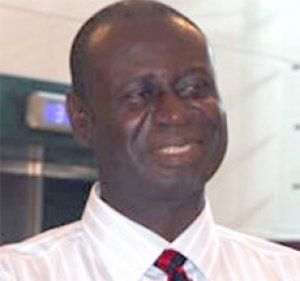The political head of the Central Region, Samuel Sarpong together with his bodyguard, the Ghana Police Service and driver, have been dragged to the Cape Coast High Court by lawyers of the poor tipper truck driver and his employers, Henry Goldberg Haulage Limited, to explain why their victim was subjected to threats and severe beatings, thereby, rendering him partially deaf.
Yaw Owusu (1st plaintiff) is thus praying to the court to award him GH¢100,000 (¢1bn old cedis) as damages for assault and battery, in addition to GH¢31.00 compensatory damages for multiple injuries as a result of the battery.
Furthermore, he is praying the court to award him loss of earnings for the two weeks he had to stay at home without work. His employers, Henry Goldberg Haulage Limited (2nd plaintiff), on the other hand, is also praying the court to award them loss of earnings for the two weeks their truck was grounded, as well as costs.
In a suit filed at the Cape Coast High Court on Friday, November 1, 2013, by ACA Law Consult Limited, the plaintiffs argued that on October 8, 2013, at about 2:00 p.m., Yaw Owusu was in the normal course of his business and driving a tipper truck with registration number GS 7484 -09, which was loaded with sand on the Winneba-Kasoa road, heading towards Accra.
According to Yaw Owusu, as a result of a road traffic accident which had occurred earlier on the said road, there was huge vehicular traffic, and as a result, motorists were moving at a slow pace.
He said the defendants, Samuel Sarpong (Central Regional Minister), Kwame Olympio (bodyguard), and Akwasi Afrifa (the Minister’s driver), while driving in a Toyota Land Cruiser with registration number GB 265 -12, negligently drove in the middle of the main road towards Accra without due care and skill, endangering life and property, and crossed the tipper truck driven by the first plaintiff.
The plaintiffs, in the writ of summons, argued among other things, (a) that the Defendants owed a duty of care to the Plaintiff and to other road users while driving; (b) that the Defendants breached the duty owed to the Plaintiff and other road users by driving in the middle of the road without due care and skill; (c) that Plaintiff upon noticing the Defendants lack of due care prompted the defendant about the negligent driving, which inflamed the egos of the Defendants; (d) that the Defendants rushed out of their car, leaving the right passenger’s door open, and without consideration to other road users, and without any warning to the Plaintiff, pulled the Plaintiff out of the tipper truck; and (e) that Plaintiff had no time to engage the brakes, thus the tipper truck rolled to a stop, which caused damage to the vehicle the Defendants were in.
The plaintiff avers that the defendants, after forcibly pulling him out of the car, began to severely beat him. According to him, due to the beatings by the defendants, he sustained severe injuries, for which he was treated at the Maamobi General Hospital.
The lawyers of the plaintiff argued that the beating up of the tipper truck driver by the defendants was “intentional.”
“That there was a physical contact of the plaintiff person and body by the defendants, as they opened the door to the driver, held his clothes, and pulled him out of the tipper truck, beat him up and forced him into the defendants vehicle,” noted the lawyers of Yaw Owusu in their writ of summons.
According to the lawyers, the plaintiff did not consent to the unlawful touching by the defendants, and that he also suffered severe injuries from the acts of the defendants, resulting in injuries such as a swollen face, severe pain in the left ear, waist pains, rib pains, and general body pains.
They said the compensatory damages in the sum of GH¢31.00 for the plaintiff was for the multiple injuries he suffered as a result of the battery, whereas the GH¢100,000 damages was for assault and battery, since the “Plaintiff has incurred substantial costs for his healthcare (medical bills and purchase of medications) and earnings, as he was unable to work.”
General News of Wednesday, 6 November 2013
Source: The Chronicle

















